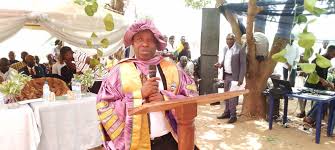Emmanuel Onwubiko
Ironically, the appointment IGP Suleiman Abba came about the same time Major Hamza Al-Mustapha was surreptitiously freed by the Court of Appeal from his conviction by the Lagos state high court for murder of the wife of the winner of the 1993 presidential election Mrs Kudirat Abiola.
There were sinister nexus drawn by opposition politicians between the release of Al-Mustapha and the appointment of his ‘boy,’ Abba, as IGP. The All Progressives Congress (APC) tried unsuccessfully to link this appointment with a plot by the President to use the Police to rig and manipulate the 2015 general elections. This plot failed because the prosecutors are from the Lagos state judiciary controlled by this same opposition and for the fact that Lagos state failed to appeal the release at the Supreme Court.
But President Jonathan shoved aside these mounting criticisms and proceeded to confirm the appointment of Abba to head the policing institution that has come under considerable focus from the global human rights community because of the notoriety of the operatives for brutal repression of civil freedoms of members of the Nigerian public. Before winding up this piece I will cite a part of the damaging report issued by the United States based Human Rights Watch on the human rights profile of the police of Nigeria in 2014.
Among the highlights of the groundswell of opposition to the selection of Mr. Abba was the doubts expressed among observers that as a product of the status quo of the deeply credibility deficit and challenged policing institution, it was almost impossible to expect the new helmsman to introduce sweeping changes that are capable of winning the confidence, trust and love of Nigerians for this weakened national institution.
But as Africans say the morning shows exactly how the rest of the day would be and also as philosophically concluded by Socrates the “first step in every activity is of the highest essence”, the newly confirmed police chief has demonstrated that it would surely be business-as-usual and that rather than try to fix the police, the credibility may further be driven irreparably to the dustbins of history.
Abba withdrew all police security operatives attached to Speaker of House of Representatives, Aminu Waziri Tambuwal, the number four citizen. The reason for this unreasonable action was illogical and laughable. Following the invasion of the National Assembly complex, opposition parliamentarians had to disgracefully scale the fence so as to attend the emergency session for an extension of the state of emergency in the North-east states. But again, why did the armed police sent to invade the National Assembly seek to disallow some opposition members of the House from gaining access whereas it had allowed members of other parties including the deputy?
The actions of this IGP in his deeply partisan war with the speaker have greatly harmed the scarce image still left of the police prior to his appointment. These actions have graphically demonstrated that the Nigeria Police Force is unwilling to shed off the dangerous toga as the institution of repression similar to the armed forces of the Saddam Hussein’s era in Iraq prior to the United States invasion and hanging of Saddam.
The book titled: “The Saddam Hussein Reader: Selections from leading writers on Iraq” as edited by Turi Munthe, narrated how Saddam destroyed the armed forces and police of Iraq and made them the notorious institutions of repression, killing thousands of opposition politicians, journalists, civil society activists and clerics who oppose the regime.
The IGP in Nigeria should read this book and immediately retrace his missteps to avoid leading the policing institution into messier pitfalls. The book said: “The army was the mainstay of the repressive regimes that ruled Iraq from 1958, when the Hashemite monarchy was overthrown, until 1968, when the Baath party seized power for the second time. It played a major role in internal security and in stamping out dissent. It engineered three successful coups. And it intervened repeatedly in affairs of state.”
On the extensive damage caused the Iraqi armed forces the writers stated that the membership of the army, police and other para-military institutions were infiltrated by card carrying politicians and by so doing professionalism was lost.
The result of disbandment of professionalism is the current inability of the Iraq military to crush the threats posed to the sovereignty of that country by the global jihadist terrorists- the Islamic state of Iraq and Syria – that has almost succeeded in breaking up that once united country. The United States is currently bombing these terrorists to save Iraq from destruction.
The trend whereby politicians cross to other parties is reprehensible but the Nigeria Police must not take the laws into its hand and pick which defector it will use brute force to chase out of office. Over the last few months, the ruling PDP has also benefitted from this apparent illegality but the police did nothing. So, why this open partisanship? The IGP must be stopped from further destroying the Nigeria Police just as the political class must support the clamour for a constitutional change to create state police to make the policing institution much more effective and people-friendly.
Onwubiko wrote from Abuja



